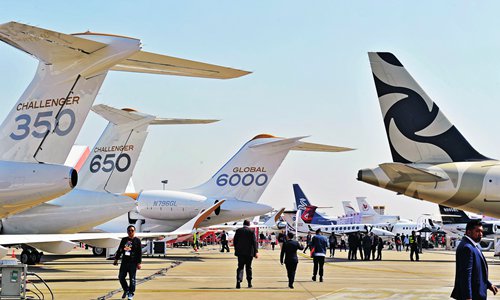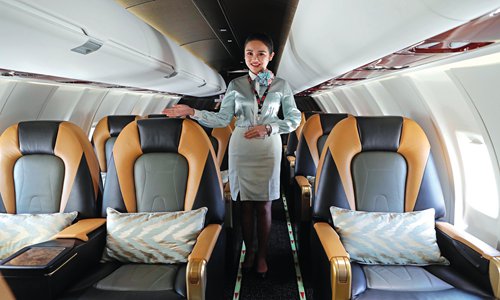HOME >> BUSINESS
Chinese private jet buyers shift from traditional sectors to new IT and high-tech industries
By Li Xuanmin Source:Global Times Published: 2019/7/8 15:48:39
Buyers shift from property and food sectors to emerging industries in IT and high-tech as economic structure evolves

A view of the Asian Business Aviation Conference & Exhibition (ABACE) held in Shanghai in April 2018 Photo: VCG

A flight attendant shows the interior design of a jet at ABACE in Shanghai. Photo: VCG
Who are the top retailers in China that you can name from memory? Real estate agencies? Insurance companies? Jewelry and luxury products vendors? Yes, they may have made profits up to millions of yuan in their careers, but in terms of revenue, all these industries give way to a rising new occupation: private jet sellers.
Ji Guang, co-founder and CEO of business aviation integrated service provider Global Wings, is one of these top retailers who could earn revenue between $20 million to $70 million per order by selling private jets to Chinese billionaires "who are positioned at the tip of the wealth pyramid."
In the past decade, demand for private jets experienced "explosive growth" in China along with the country's economic boom, which gave birth to a group of wealthy Chinese entrepreneurs whose personal assets have exceeded $1 billion.
In tandem with the soaring demand, Ji, along with his team, has successfully sold about 110 private jets thus far, including second-handed one, with customers ranging from businessmen in traditional sectors such as property, food and retail, to those in newly emerging industries such as information technology and online gaming — also a mirror of how China's economic structure evolves.
According to a report issued by the research institute Hurun Report, a total of 114 Chinese entrepreneurs have purchased 164 private jets as of the end of 2017, up 35 from 2016. Out of the 114 Chinese billionaires who possess business jets, 78 claim assets over $1 billion.
Among the list revealed by Hurun, Chinese tycoons including Wang Jianlin, Alibaba's founder Jack Ma Yun, Hong Kong billionaire Li Ka-shing and Tencent's founder Pony Ma Huateng all own business aircraft.
"To be honest, all private jet retailers have a list with a handful of names: potential customers who can afford to purchase a business aircraft. Learning their demands, responding in a professional and warm manner and earning their trust are the first steps for successful sales," Ji told the Global Times over the weekend.
The man in his 30s, who could update the Global Times of the most popular types of business jets among Chinese billionaires and their corresponding flight parameters such as flight length and fuel consumption, noted that it takes at least five to 10 years in the aviation industry before being qualified as a private jet retailer.
How are private jets sold?
Selling a business jet is not like "selling cabbage", as it involves a cost between $20 million and $70 million, plus a management fee of 30 million yuan ($4.35 million) per year.
While some orders could "luckily" be completed within two months, the longest orders could last for years. Sometimes, even a disagreement concerning a small term in the contract, such as providing free training or the time zone for a payment due, could take a week or so to negotiate and settle, according to Ji.
Liao Xuefeng, CEO of private jet retailer CBA Jet, could still clearly recall an order that he had tracked for a decade during an interview with the Global Times.
In 1997, Liao talked with one client, who was also one of China's first batch of successful entrepreneurs. The two agreed initial purchase intent, but it was not until 2011 that Liao heard from him again. The entrepreneur explained that he had had a car accident which had severely damaged his health over the past 10 years. Upon recovery, he had immediately searched for Liao's contact number and then in 2013, he purchased three business jets from Liao.
The case is just one example of how top retailers, based on their rich experience, have built trust with potential jet buyers, most of whom are introduced by friends or existing clients.
"What kind of business jets do China's wealthiest want to buy? How large should the aircraft be? What are their expectations of maximum flight length? Billionaires cannot answer these questions because they're not experts in the industry," Ji said.
As such, some of the first enquiries he makes when meeting with potential buyers are their budget, their frequent travel destinations and their travel plans, such as the number of people that usually take a flight. Based on clients' answers, he makes charts which show comparative data of different jets and make recommendations accordingly.
"It is important that you talk to the billionaire on equal footing rather than simply selling an item, because it is the entrepreneur who eventually makes the decision," Liao said. "You need to have something to talk about with the buyers, and this is extremely difficult."
There are also common preferences among Chinese billionaires, such as luxurious interior decoration, a large space and Wi-Fi connection, according to Ji. Certain types of business jets, such as the Gulfstream G650, the Bombardier Global 7500, the Boeing 787 business jet and the Dassault Falcon 8X Private Jet are popular among China's wealthiest.
Ji's company, Global Wings, also arrange flight experiences to show potential buyers a jet's key performance indexes directly, allowing them to observe a jet's facilities, services and aircraft noises.
"Some may think that retailers only sell business jets, but we're providing full services from the initial sale to aircraft registration, financing, management, air route application, maintenance, and renovation," Ji said.
A growing market
China's business jet market began in 2000, at a time when the country's economy had embarked on a rapid expansion. It was at that time that Chinese billionaires began to accept the concept of business jets and learned their unique edge in privacy and convenience and how they could improve work efficiency.
Liao's first order also came in at that time.
In 2003, Qiu Dedao, the chairman of the Daoyuan Group, signed a letter of intent with Liao to buy a small jet worth $3.3 million after a test flight experience, but later hesitated to pay the deposit as his friends and family told him the purchase was unnecessary.
Several months later, Liao learned that Qiu's flight to an airport in Changsha, capital of Central China's Hunan Province, had been canceled, which led to dissatisfaction from his Changsha clients. Liao immediately arranged a chartered flight that was able to send Qiu to Changsha on time, with two uniformed pilots accompanying him to meet the clients. "After returning to Beijing, Qiu immediately purchased a business jet," Liao recalled.
In 2018, China's business jet market has grown 347 percent year-on-year compared with a decade ago, making the country the fastest-growing market in the world, according to a report issued by Vistajet.
Alongside this expansion is a change in how billionaires view business jets. Now, more businessmen are beginning to view business jets as "time machines" and tools for social life rather than a way to boast their wealth, according to Ji.
Potential buyers are also shifting from property and food sectors as China's newly emerging industries, such as information technology and high tech, are creating the young superrich.
For example, the youngest clients both Ji and Liao have on their receipts are in the region of 30-year-old.
"The youngest buyer I met was from the gaming industry. He worked really hard with his team for two years and encouraged his employees by telling them he would buy a business jet and take them travelling around the world after finishing a project," Liao said.
"He kept his promise and bought the jet after successfully selling the online game to Alibaba. It took him only two weeks to pay."
Newspaper headline: Private jets for China’s wealthiest
Posted in: ECONOMY,BIZ FOCUS